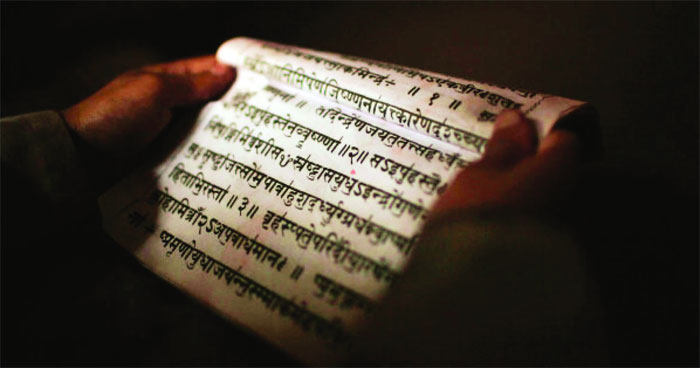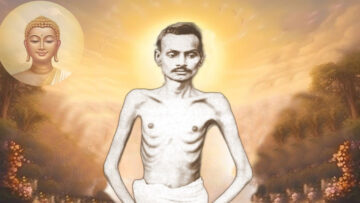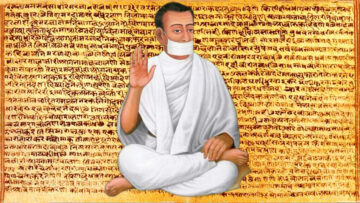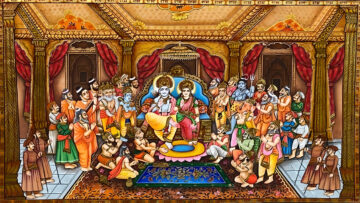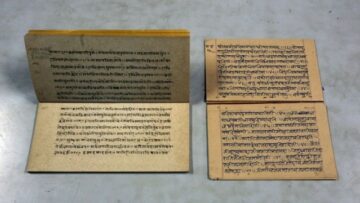A young Indian college graduate from the US wrote recently:
कश्चन अमेरिकीय-स्नातकः भारतीयः युवा सद्यः एव अलिखत् –
“During my undergrad at Cornell, I learnt the basics of Nyāya from a proponent of ‘The Death of Sanskrit’ theory. According to him, the Bhagavad Gita was a manual of casteist morality, which advocated the annihilation of one’s clan if required by one’s caste-based duties.
The same department offered a course on the philosophy of war, exploring the “just war theory” in Western Theology. For an impressionable mind, the contrast between a tradition supposedly justifying reckless violence and a systematic philosophy of war was striking.
This led me to investigate the Indian tradition for a theory of just war. To my surprise, I found not just a large body of original material in the Mahabharata and Smriti texts but also extensive scholarship ranging from Ramanuja and Madhusūdana Sarasvatī to P. V. Kane.
I submitted a paper in the class on “the concept of the Just War in the Gita.” When challenged for not providing any “academic” (read ‘western’) citations, I replied that I knew Sanskrit and relied on my own translations of the originals, for which I deserved extra credit!”
– Kushagra Aniket, Cornell University
“कौर्नेल् इत्यत्र मम स्नातकाध्ययनदिनेषु न्यायशास्त्रस्य प्रथमस्तरम् अहम् अधीतवान् ‘The Death of Sanskrit’ इति सिद्धान्तस्य समर्थकात्। तस्य मतानुसारं भगवद्गीता नाम जातिवादस्य शास्त्रं यत्र जातिगतकर्तव्यं साधयितुं कुलनाशोऽपि समर्थितः।
स एव विभागः युद्धनीतिविषयेऽपि पाठम् अयच्छत् यत्र पाश्चिमात्य: ‘just war’ सिद्धान्तः अनुसन्धीयते। अपक्वबुद्धिनं जनं धर्मसम्मतनिरर्थकहिंसायाः युद्धनीतिविचारणायाः भेदः अघातयत्।
तस्मात् अहं भारतीयपरम्परायां युद्धनीतिविषये आन्विषम्। आश्चर्यं नाम न केवलं मया महाभारत-स्मृत्यादिषु नैकेषु ग्रन्थेषु मूलवस्तु प्राप्तं किन्तु महता प्रमाणेन भाष्यादिश्च रामानुजात् मधुसूदन-सरस्वती-तः पी-वी-काणे पर्यन्तम्।
वर्गे “गीतायां युद्धनीतिः” इति विषये प्रबन्धम् अलिखम्। शैक्षिक-(पाश्चात्त्य-)उद्धरणानि न दत्तानि इति आक्षेपे सति मया प्रत्युत्तरितं यत् संस्कृतज्ञोऽहं स्वयमेव अनूदितवान्, अतः वस्तुतः अधिकगुणानाम् अधिकारी अस्मि।”
– कुशाग्रः अनिकेतः, कौर्नेल् विश्वविद्यालयः
What is wrong with Indology?
भारताध्ययने कः दोषः?
- For an academic enterprise that claims to study Indian culture, language and civilization, what explains the stark absence of native voices and views from Indology?
- भारतीयसंस्कृति-भाषा-सभ्यतानाम् अध्येतॄन् आत्मनः मन्यमानैः तैः तेषामध्ययनेषु भारतीयविचाराः, भारतीयचिन्तनानि च परित्यक्तानि, अत्र किं कारणम्?
- Why do we see only western authors, study references and analytic frameworks and never find any Indian ideas, knowledge systems and native voices?
- कुतः पाश्चात्त्याः एव लेखकाः, शिक्षणपद्धतयः, सिद्धान्ताः न कदापि भारतीयकल्पनाः, शास्त्रज्ञानं, स्थानीयध्वनयः च?
- In Civilizational and Cultural studies, what voice do natives have in an enterprise that deeply impact their identity as well as value systems?
- संस्कृतिसभ्यतयोः अध्ययने यत्र स्थानिकानां स्वत्वं मौलिकत्वं च परिशील्यते तत्र तेषां परामर्शः कुत्र?
- What is the role of ‘Outsiders’ in interpreting, formulating and controlling the discourse for a living culture?
- जीवत्याः सभ्यतायाः व्याख्यानं निरूपणं नियमनं च कर्तुं ‘बाह्यानां’ का प्रसक्तिः?
- What should be the ethical relationship and dynamics between the powerful interpreter and the silent interpreted?
- शक्तिमतः व्याख्यातुः तथा च अशक्तस्य अनूदित-व्याख्यापात्रस्य नैतिकसम्बन्धः परस्परसंवादश्च कथं स्यात्?
- What is the basis of the claimed authority of Indology to confidently interpret and pass judgment on an entire culture or civilization?
- भारताध्येतॄणां समग्रसभ्यतायाः निःसङ्कोचं विनिर्णयं कर्तुं स्वघोषितस्याधिकारस्य मूलं किम्?
Unlike Black, Gender and other identity studies in the western academe, Indology in general and Sanskrit studies in particular, have been living a charmed existence. Controlled by an elite ‘western’ academic community located far away from the living source culture, this Indology group has successfully resisted decolonization and managed to escape the evolving social and ethical norms around cultural sensitivity and appropriation.
पाश्चात्त्ये शिक्षाक्षेत्रे कृष्णवर्णीयानामध्ययनं लिङ्गभेदाध्ययनम् अन्यानि च आत्मशोधकाध्ययनानि यानि, तेभ्यः भारताध्ययनं तत्रापि संस्कृताध्ययनं विशेषतया राजते। जीवतः स्रोतसः अतिदूरं तिष्ठन् कश्चन विशिष्टवर्गीयः ‘पाश्चात्त्यः’ शिक्षकसमाजः अत्र नियामकः। एतेन वर्गविशिषेण मानसिकदास्यस्य परिहारः सर्वथा निराकृतः। संस्कृतिविषयकां जागरूकतां संस्कृतेः अपहारं चावलम्ब्य मथ्यमानेभ्यः सामाजिकनिर्बन्धेभ्योऽपि एते पलायन्ते।
How does Indology justify and deploy its reins over the Indian and Sanskrit discourse? What are the components of the elaborate narrative deployed by the western academe to justify and maintain their hegemony over native voices?
कथं नाम एते भारताध्येतारः भारतविषयके संस्कृतविषयके च परिभाषणे स्वीयम् अधिशासनं समर्थयन्ति ? कथं वा विनियुञ्जते? के नाम तेषां सविस्तरस्य आख्यानकस्य अवयवाः यैः एते भारतीयविचारेभ्यः पृथक् स्वीयं प्राबल्यं समर्थयन्ति पोषयन्ति च?
A few recent examples help us understand the unique dynamics of building and sustaining the Indological narrative by means of primarily controlling Sanskrit – the language and by extension Indian cultural and civilizational discourse
संस्कृतस्य नियमनेन तदनुगुणं भारतीयसांस्कृतिकपरिचर्चायाः नियमनेन आख्यानकस्य निर्माणं संवर्धनं च कथं भवति इत्यस्य कानिचन सद्यस्कानि उदाहरणानि
![]()



Rohana Seneviratne, DPhil (Oxon), of the University of Peradeniya, Sri Lanka in his 2019 article “Speaking in God’s Tongue” writes:
a) Professors at Harvard, Oxford and Columbia are several times more meticulous and assiduous that MOST Indian traditional scholars
b) If anything is to be blamed, it is their willingness to not take religious and divine claims at face value and their high academic standards that far exceeds the Indian scholars
c) Westerners are more pedantically ‘traditional’ in their learning than the pundits
d) Western scholars engage in the time-tested ‘debate’ model in pursuit of the truth unlike modern Indian Pundits
e) Indian texts are full of religious and mystic garbage that can be stripped off only by dispassionate westerners.
f) Some Sanskrit doyens have a saint-like stature but are really forgers. Indians are too biased to highlight them and would benefit from an external referee.
रोहन-सेनविरत्नः, श्रीलङ्कायाः पेरदेनियविश्वविद्यालयात् डी फिल्, “Speaking in God’s Tongue” इति स्वीये २०१९वर्षे प्रकाशिते लेखे लिखति,
अ) बहुधा पारम्परिक-भारतीय-विद्वद्भ्यः हार्वर्ड्-आक्सफर्ड्-कोलम्बियास्थाः प्राध्यापकाः अतितरां सुदक्षाः परिश्रमिणः च।
आ) धार्मिकाख्यानेषु न बुद्ध्या विश्वसन्ति, भारतीयविद्वद्भ्यः तेषां शिक्षास्तरः अत्यन्तम् अतिशेते, इति स्यात् यदि नाम पाश्चात्त्यानां दोषोऽस्ति।
इ) पण्डितेभ्यः पाश्चात्त्याः अध्ययने विशिष्य पारम्परिकाः।
ई) पाश्चात्त्यविद्वांसः कालाबाधितया ‘वाद’पद्धत्या सत्यान्वेषणं कुर्वन्ति, न यथा भारतीयपण्डिताः।
उ) भारतीयग्रन्थाः धार्मिक-अतिमानवीय-प्रलपनेन पूर्णाः, अपक्षपातिभिः पाश्चात्त्यैरेव तत् निस्सारयितुं शक्यते।
ऊ) केचन संस्कृतमयूखाः मुनयः इव पूज्यन्ते किन्तु वास्तविकं ते वञ्चकाः। भारतीयाः पूर्वाग्रहदूषिताः अतः बाह्यप्रेक्षकः कश्चन अपेक्षितः वञ्चनम् उद्घाटयितुम्।
![]()



In a similar vein, Sumit Paul, a self-acclaimed Sanskrit and Semitic language scholar, writes in the Deccan Herald (2019) under the headline “Who killed Sanskrit?”
a) The real centers of Sanskrit scholarship today are in Europe and the USA, specifically the likes of Oxford, Harvard, Heidelberg etc.
b) No one studies Sanskrit in India and the language is practically dead in its homeland
c) Professors of Sanskrit in India are whiling away their time while getting hefty salaries.
d) The Indian professors do not know Sanskrit and cannot speak Sanskrit at all. Whatever they research and write is in any case shoddy and sub-standard.
e) Western Sanskrit scholars have marvelous knowledge of Sanskrit and truly know how to cherish the language. They are the true Jedi masters
f) In fact, Wendy Doniger, the American scholar speaks 3 types of Sanskrit – modern, colloquial as well as Vedic Sanskrit! (In all probability, a monologue since no one has spoken Vedic Sanskrit for the past 1500 years, at the very least!)
एवमेव सुमित-पौल्, संस्कृत-शेमीय-भाषाणां स्वयंघोषित-पण्डितः, डेक्कन्-हेराल्ड् इति पत्रिकायां 2019तमे वर्षे “Who killed Sanskrit?” इति शीर्षकान्तर्गतम् अलिखत्,
अ) संस्कृताध्ययनकेन्द्राणि अद्यत्वे यूरोप्-अमेरिकासु, तत्रापि आक्सफर्ड्-हार्वर्ड्-हीडल्बर्ग्-आदिषु सन्ति।
आ) भारते कोऽपि संस्कृतं न पठति, स्वगृहे एव संस्कृतं साक्षात् मृतम्।
इ) भारते संस्कृताध्यापकाः प्रभूतं वेतनं स्वीकृत्य केवलं समययापनं कुर्वन्ति।
ई) भारतीय-प्राध्यापकाः संस्कृतं न जानन्ति न वा वक्तुं शक्नुवन्ति। ते यत्किमपि लिखन्ति अनुसन्धानं कुर्वन्ति वा तत् सर्वं वस्तुतः निस्सारम् अप्रामाणिकं च।
उ) पाश्चात्त्यविद्वांसः एव संस्कृतं सुदृढतया अवगच्छन्ति तस्याः भाषायाः संवर्धनं कर्तुमपि जानन्ति। ते एव खलु जेडै-स्वामिनः।
ऊ) वस्तुतः वेण्डी डौनिगर्, अमेरिकीया विदुषी, त्रिविधं संस्कृतं वदति – नूतनं स्थानिकं वैदिकं चेति! (प्रायशः स्वगतमेव यतो हि वैदिकं संस्कृतं गतेभ्यः न्यूनातिन्यूनं 1500वर्षेभ्यः न केनाप्युच्चरितम्!)
The theme of both these articles is that the western Sanskritist is today the true pacesetter as well as ‘owner’ of Sanskrit. Given their obvious lack of quality and inability to speak the language, the traditional Indian pundit class has lost all moral authority to even claim their patrimony. It is better for the future of the language and the Indian civilization that we accept the suzerainty of the enlightened west
उभयोरपि लेखयोः सारः अयं यत् पाश्चात्त्यः संस्कृतज्ञः एव अद्य वस्तुतः संस्कृतस्य गतिमानकः स्वामी च। पारम्परिक-भारतीय-पण्डिताः यतो हि गुणहीनाः संस्कृतसम्भाषणे असमर्थाः च, अतः पैतृकाधिकारं प्रार्थयितुमपि न तेषाम् अधिकारः। संस्कृतस्य, भारतीयसभ्यतायाः च उज्ज्वलभविष्याय एतदेव वरं यत् वयं प्रबुद्धस्य पश्चिमस्य आधिपत्यम् अङ्गीकुर्मः।
An interesting third example is an article by the Indologist and Philosopher Jonardon Ganeri, DPhil (Oxon), who writes about the Upanishadic Episteme (2017)
अत्र उल्लेखनीयं तृतीयम् उदाहरणम् अस्ति भारताध्येतुः तत्त्वचिन्तकस्य च जनार्दन-गणेरी-महाभागस्य, यः 2017तमे वर्षे Upanishadic Episteme विषये लिखति।

Ganeri states that Upanishad means a ‘hidden connection’ or a ‘secret teaching’ that creates an ‘order inducing totality’. He builds his thesis by relying on the words and ideas of writers like Joel Brereton, Signe Cohen, Patrick Olivelle, and even Jorge Luis Borges.
In fact, his basic description of the objective, function, and structure of the Upanishads is provided by a Brereton reference.
These academics are shown as the foundational and probably final authorities on the topic of Upanishads.
गणेरी वदति यत् उपनिषद् इत्युक्ते निहितः सम्बन्धः अथवा गुप्तशिक्षा या ‘सम्पूर्णनियमनं’ जनयति। तेन स्वस्य मतं जोएल्-ब्रेरेट्न्, सीने-कोय्न्, पाट्रिक्-ओलिवेल्, होर्हे लूयिस् बोर्हेस् इत्यादीनां शब्दैः कल्पनाभिश्च निर्मितम्। किमुत, उपनिषदां हेतु-कार्य-निबन्धनानां चित्रणमपि तेन ब्रेरेटन्-उद्धरणेन कृतम्! एते विद्वांसः उपनिषत्विषयेषु मूलभूताः अपि च अन्तिमप्रमाणाः इति उद्दर्श्यन्ते।

There is not a single reference to any native source in this topic concerning “Upanishads”
उपनिषद्विषयेषु भारतीयेभ्यः नैकोऽपि उद्धृतः।
Where should one start? Firstly, there are multiple etymologies and nuances apart from the meaning of ‘Upanishad = secret teaching’ mentioned by Ganeri as per Indian tradition itself.
कुतो वा आरम्भं कुर्मः? प्रथमं नाम नैकाः सन्ति व्युत्पत्तयः अर्थभेदाश्च ’उपनिषत्’ इत्यस्य, पारम्परिक-शाखासु अपि।
- यथा य इमां ब्रह्मविद्यामुपयन्त्यात्मभावेन श्रद्धाभक्तिपुरःसराः सन्तस्तेषां गर्भजन्मजरारोगाद्यनर्थपूगं निशातयति परं वा ब्रह्म गमयति अविद्यादि-संसारकारणं चात्यन्तमवसादयति विनाशयतीत्युपनिषद् । उपनिपूर्वस्य सदेरेवमर्थस्मरणात्

- उपनीय तमात्मानं ब्रह्मापास्तद्वयं यतः । निहन्त्यविद्यां तज्जं च तस्मादुपनिषद्भवेत् ॥
- निहत्यानर्थमूलं स्वाविद्यां प्रत्यक्तया परम् । नयत्यपास्तसंभेदमतो वोपनिषद्भवेत् ॥
- प्रवृत्तिहेतून्निःशेषास्तन्मूलोच्छेदकत्वतः । यतोवसादयेद्विद्या तस्मादुपनिषद्भवेत् ॥
Secondly, there is a vast corpus of original bhashyas, tikas, tippanas and karikas in Sanskrit
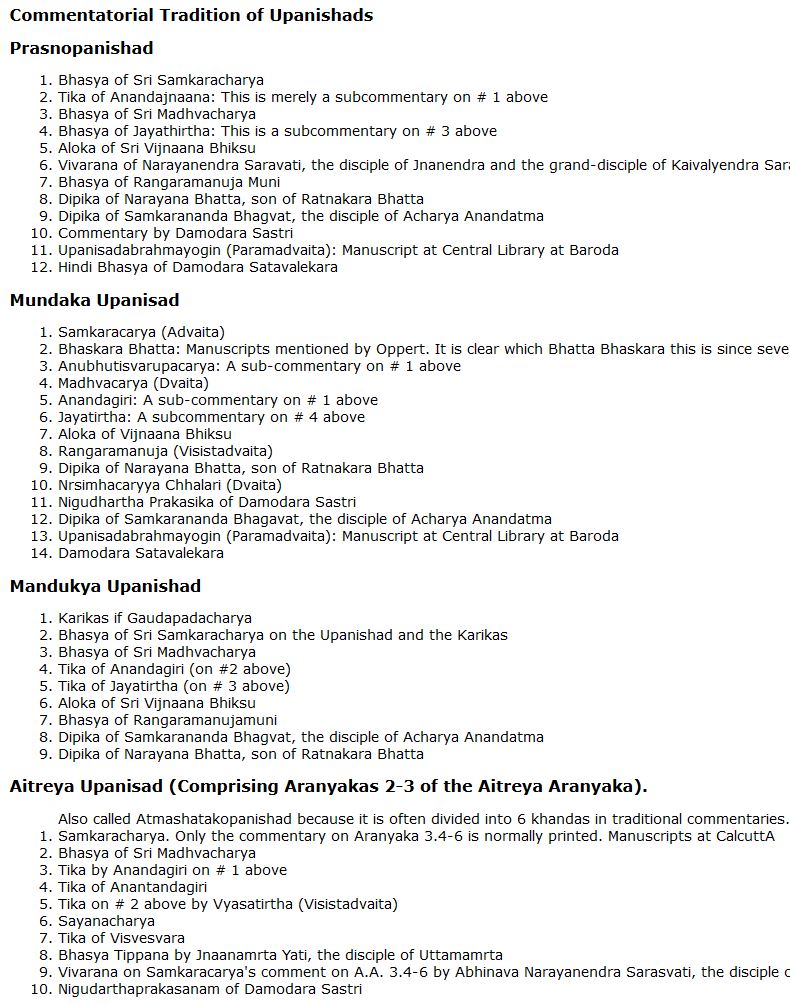 which provide a robust interpretation, analysis and explanation of Upanishads. None of them are casually referred to or present in the building up of Ganeri’s thesis of “episteme of Upanishads’!
which provide a robust interpretation, analysis and explanation of Upanishads. None of them are casually referred to or present in the building up of Ganeri’s thesis of “episteme of Upanishads’!

अपरं नाम संस्कृते एव भाष्य-टीका-टिप्पण-कारिकादीनां समुद्रः एव वर्तते यत्र उपनिषदां गाढं व्याख्यानं विश्लेषणं स्पष्टीकरणं च कृतं वर्तते। तेषु नैकमपि उद्धृतम् उल्लिखितं वा गणेरीवर्यस्य “औपनिषदिके ज्ञानवादे”।
Given that Ganeri refers to Brhadaaranyaka Upanishad in his article, a brief look at the list of available commentaries certainly do not show any dearth of options, starting right from the Shankara Bhashyam of Adi Shankaracharya
गणेरीवर्येण स्वीये लेखे बृहदारण्यकोपनिषद् उद्धृता इत्यतः तद्भाष्याणि पश्यामश्चेत् आशाङ्करभाष्यात् न न्यूनसङ्ख्यकाः कृतयः।

To top it off, while describing the idea of the human body as a cosmological map, he conveys that he finds the Brhadaaranyaka taxonomy “strange and alien’! While Ganeri is certainly entitled to his opinions, is his sense of alienation shared by native commentary? Certainly, Shankaracharya does not think so!
तदुपरि मानवशरीरस्य पञ्चमहाभूतात्मकं वर्णनं ‘विचित्रं विलक्षणं च’ भासते! गणेरी स्वस्य मतं भावयतु नाम किन्तु तस्य वैलक्षण्यं भाष्येषु परिध्वन्यते किम्? शङ्कराचार्यस्तु नानुमोदते।

Patrick Olivelle in his ‘Early Upanishads – Annotated Text and Translation (1998)’ explicitly mentions that translators do make choices as to the approach they take and that previous translators have taken scandalous liberties and have butchered the text!
‘Early Upanishads – Annotated Text and Translation (1998)’ इति लेखे पाट्रिक्-ओलिवेल् उल्लिखति यत् अनुवादकाः स्वीयाम् अनुवादपद्धतिम् अनुसरन्ति, अपि च पूर्वतनैः अनुवादकैः स्वैरम् अनूदितं मूलं च हतम्।

Olivelle himself mentions that he approaches his translation from a ‘historical, cultural and social context’.
While he has freedom to do as he pleases, the fact that there exist multiple other interpretations that may be more relevant and appropriate for a sacred work like Upanishads than the historical approach is to be kept in mind.
ओलिवेल् वदति यत् सः स्वयम् ‘ऐतिहासिक-सांस्कृतिक-सामाजिक-परिप्रेक्ष्यम्’ अनुसृत्य अनुवादं करोति। यद्यपि सः यथेच्छं कर्तुं मुक्तः एव, तथापि उपनिषद्-सदृशानां पुण्यग्रन्थानां नैकानि इतराणि भाष्याणि उपलब्धानि सन्ति यानि यथार्थानि समुचितानि च स्युः, इत्यपि अवधातव्यम्।
Given the inherent and explicit subjectivity of these translations, what makes Ganeri and other Indologists feel supremely confident coming out with such breathtaking claims on such a well traversed topic such as the Upanishadic Episteme while totally disregarding the brilliant and original intellectual scholarship of the native tradition? How do they feel ‘adequate’ referring only to the likes of Olivelle or Cohen as the gold standard references for Upanishads while disregarding the native commentary?
Isn’t it a fit case of क्व शङ्कराचार्यः क्व गाङ्गतैलिकः?
एतेषां गणेरी-प्रभृतीनां भारताध्येतृणां स्पष्टतया स्वाभाविकतया च पूर्वाग्रहदोषयुतम् अनुवादं दृष्ट्वा, औपनिषदिकव्याख्यानसदृशं सुविविक्षितं सुपरिचितं विषयमधिकृत्य एतादृशानि कल्पनातीतानि विवेचनानि कर्तुम्, अपि च सुज्ञां मूलाधारितां भारतीयां शिक्षापद्धतिं निराकर्तुं, कथमेतेषां धार्ष्ट्यं भवतीति प्रश्नः।
ननु क्व शङ्कराचार्यः क्व गाङ्गतैलिकः इति स्थितिः।
Understanding the Indological Hubris
भारताध्येतॄणाम् अहङ्कारस्य अवगमनम्
To unpack what is happening in Sanskrit studies and Indology and to understand the game, let us ask ourselves a few questions
संस्कृताध्ययन-क्षेत्रे भारताध्ययने च किं प्रचलति इति अवगन्तुं तत्रत्यं मायाजालं च परिज्ञातुं कांश्चन प्रश्नान् आलोचयामः
Issue 1: Given the claimed leadership and expertise of western Indologists in Sanskrit, how is it that we hardly see any articles written by them primarily in Sanskrit? Why are all the articles in English, German and other European Languages? Can we round up more than 10 original articles published in Sanskrit in the recent past by acclaimed Indologists like Sheldon Pollock, Wendy Doniger, Patrick Olivelle, Jonardon Ganeri, etc.?
प्रथमः आक्षेपः = पाश्चात्त्य-शोधकानां स्वघोषितां विद्वत्तां नेतृत्वं चोपलक्ष्य कथं नु तेषां संस्कृतलेखाः विरलतया हि दृश्यन्ते? । किमर्थं समग्रं लेखनं आङ्ग्ल-जर्मनादिभिः यूरोपीयभाषाभिः एव? प्रसिद्धैः भारताध्येतृभिः शेल्डन्-पोलौक्-वेण्डी-डनिगर्-पाट्रिक्-ओलिवेल्-जनार्दनगणेरी-सदृशैः सद्यःकाले लिखितानि दश वा संस्कृतलेखानि प्राप्तुं शक्नुमः ?
Issue 2: Given the claimed mastery of the spoken language by the Indological leadership, including ‘Vedic-Spoken-Sanskrit’, why are there so few speeches, recordings or videos in public domain of leading western Indologists speaking and discussing in chaste, properly accented Sanskrit as befits a modern pundit?
द्वितीयः आक्षेपः = भारताध्येतॄणां लौकिक-संस्कृत-सम्भाषणे प्रावीण्ये सति किमर्थं सार्वजनिकस्थलेषु अग्रेसरैः कृतं शुद्ध-सस्वर-संस्कृत-सम्भाषणं द्रष्टुं दुर्लभम्? किं बहुना वैदिक-संस्कृत-सम्भाषणेऽपि केषाञ्चन विदुषां दार्ढ्ये सति जनसभासु वा कुत्रचित् तेषां भाषणं चर्चा वा प्राप्येत यस्मात् कोऽपि आधुनिकपण्डितः सिद्ध्येत् ।
Issue 3: As befits the claims of being true inheritors of Sanskrit, how many original works of literature, science, economics, poetry and mathematics have any of these western Indology Pundits produced in Sanskrit over the past 150 years? If they are experts with a deep and meticulous approach to studying Sanskrit and Indian culture, surely, they would be able to show a slew of path-breaking, original Sanskrit intellectual works that push the boundaries and are awe-inspiring?
तृतीयः आक्षेपः = संस्कृतस्य वास्तविक-दायार्हाः इति स्वान् प्रतिपादयतां पाश्चात्त्य-भारताध्येतृणां पण्डितम्मन्यानां कियत्यः मूलरचनाः साहित्य-विज्ञान-अर्थशास्त्र-काव्य-गणितादिषु गतेषु 150 वर्षेषु निर्मिताः दृश्यन्ते? यदि ते वस्तुतः संस्कृत-संस्कृतिविषये गभीरं सूक्ष्मं चाध्ययनं कुर्वाणाः विद्वांसः, तर्हि एतावता नवीन-ज्ञानराशिः एव प्रस्फुटितोऽभविष्यत् येन च प्रेरणाभूताः मौलिक-संस्कृत-ग्रन्थाः अवर्धिष्यन्त।
Issue 4: Given the claim of traditional training under Pundits and fierce internal debates in Western Universities, how do we never see them engaging in a traditional Sanskrit debate (VakyarthaSabha) that are still conducted in India? How is it that they publish reams and reams of articles on Vedas, Puranas, Darshanas, Shastras and Kavyas, but are coy about not engaging with the leading Indian Pundits to publicly debate and clarify deep academic and philosophical issues in the chosen language – Sanskrit?
चतुर्थः आक्षेपः = केचन भारताध्येतारः पारम्परिक-भारतीय-पण्डितेभ्यः संस्कृतज्ञानम् अर्जितवन्तश्चेत्, पुनः यदि पाश्चात्त्य-विश्वविद्यालयेषु आन्तरिक-भीषण-वादाः प्रचलन्ति चेत् भारतम् आगत्य कदाचित् वाक्यार्थसभायां भागं किमर्थं न गृहीतवन्तः अद्यपर्यन्तम्? भारतदेशे तु इदानीमपि वाक्यार्थसभाः बहुत्र प्रचलन्ति । कथं ते वेद-पुराण-दर्शन-शास्त्र-काव्यादिविषयेषु लेखानां पर्वतान्येव निर्मान्ति परन्तु पारम्परिक-भारतीय-पण्डितैः सह सार्वजनिकस्थले शैक्षणिक-दार्शनिक-विषयेषु स्वपाण्डित्योद्घुष्टायां संस्कृतभाषायां चर्चितुमपि नोत्सहन्ते असमर्थाः च प्रतीयन्ते?
Issue 5: If the Indologists are true inheritors of the Sanskrit legacy, who are mandated to carry the flame forward, why are their specific research areas and topics of interest such a radical departure from all prior ‘insider’ research and study trajectories as well as areas of interests of Indian Pundits and intellectual masters, even up to the early 19th century? Why are they never interested in the nuances and issues re: Purusharthas – Dharma, Artha, Kama and Moksha, as a means of providing meaning and sustaining life, a topic that has been at the top of the mind for more than two thousand years?
पञ्चमः आक्षेपः = यदि भारताध्येतारः एव संस्कृतपरम्परायाः संवाहकाः यैः मार्गदर्शनं करणीयं तर्हि किमर्थं तेषां विषयरुचिः परम्परागत-विषयैः सह ईषदपि समानः न वर्तते? अर्वाचीनयुगेऽपि 19तम-शतकं यावत् भारतीय-शास्त्रिभिः यथा शोधमार्गः प्रदर्शितः तन्मार्गात् आधुनिक-भारताध्येतारः दिग्भ्रान्ताः किमर्थं प्रतीयन्ते? धर्मार्थकाममोक्षविषयेषु यस्मात् जीवनस्य सार्थक्यं सिद्ध्येत् तेषु किमर्थम् अनासक्ताः? द्विसहस्राधिक-वर्षात् भारतीय-मनीषिभिः मनसि ये विषयाः मथिताः तेषाम् अध्ययनं कृत्वा तत्रत्य-सूक्ष्मांशान् किमर्थं नोद्धरन्ति?
Why is it that their research topics are solely focused on ‘textual analysis’, ‘internal inconsistencies’ and ‘recensions’ and ‘controversies around authorship and timelines’ that questions the integrity of canonical Indian texts and aims to firebomb ‘meaning and belief’ out of the native culture?
बहुशः तेषां शोधकार्याणि किमर्थम् अवान्तरविषयेषु निमग्नानि? यथा ग्रन्थे विद्यमान-दोषाणाम् उद्धरणं, कालकृतिविषये मतभेदानां दीर्घान्वेषणम्, अनन्तरकाले योजितमिति उक्त्वा प्रामाणिकतायां शङ्का-प्रकटनं यस्मात् भारतीयैः पूजितानां ग्रन्थानां सामान्य-जनचेतनात् श्रद्धाभावस्य लोपः एव भवेत्?
More importantly, for avowed Sanskrit lovers, why is there a tremendous interest in the ‘death of Sanskrit’ and not in its revival and resurgence?
मुख्यतया इमे अत्यन्त-संस्कृतानुरागिणः भारताध्येतारः संस्कृतस्य मरणे एतावद् आसक्ताः परन्तु संस्कृतस्य पुनरुज्जीवने वर्धने च किमर्थम् उदासीनाः?
Weak Claims and Alibis
निःसत्त्वं प्रतिपादनं व्याजोक्तयः च
The typical rejoinders provided by the Western Indologists and their acolytes to these searing moral, ethical and logical questions include:
नैतिक-मौलिक-तार्किक-प्रश्नानां पाश्चात्त्य-भारताध्येतॄणां सामान्योत्तराणि एवं सन्ति –
- Indology studies Sanskrit tradition, true. But Indologists are not and do not want to be a part of the tradition. [The objective is to analyse the tradition, pull it apart and see how it works. The key is to see what is wrong here, not what is right!]
- भारताध्ययने संस्कृतपरम्पराध्ययनं भवति इति सत्यम् । परन्तु भारताध्येतारः अस्याः परम्परायाः अङ्गभूताः न सन्ति भवितुम् अनासक्ताः च । [नाम तेषाम् उद्देशः परम्परायाः अध्ययने, तस्य आन्तरिक-यन्त्रविधौ अस्ति । छिद्रान्वेषणमेव मुख्यं न तु तस्याः महत्तायाः प्रस्थापनम् ]
- The Indologist’s work must be readable and understood by the broader scholarly community. This academic community can be engaged with effectively, only by communicating in English. So, while they may know Sanskrit, they do not see any reason to publish in Sanskrit. [The Indian pundit who does not know English is not the target audience and is not considered part of the academic community.]
- भारताध्येतुः कार्यं सर्वैः विद्वद्भिः सुपाठ्यम् अवगम्यं च भवेत् । अस्यां विद्वद्परिषदि आङ्ग्लभाषायाः प्रयोगेणैव विचारविनिमयः सम्यक् भविष्यति । अतः यद्यपि तैः संस्कृतभाषा ज्ञाता तथापि तस्यां भाषायां ज्ञानविनिमये अभिलाषा नास्ति । [भारतीयपण्डितः यः आङ्ग्लं न जानाति तस्य कृते अयं ज्ञानविनिमयः नास्त्येव अपि च सः विद्वद्परिषदि न गण्यः। ]
- Most western Indologists have spent time in India and diligently studied with traditional Sanskrit Pundits. So, they are on par with the Indian pundits and you should not question their mastery of Sanskrit. [Please take it on our authority that they are fluent masters in Sanskrit]
- बहवः पाश्चात्त्य-भारताध्येतारः भारते कालं व्यतीतवन्तः पुनः पारम्परिक-विद्वद्भिः सह अवधानेन पठितवन्तः । अतः ते ज्ञानसामर्थ्ये भारतीयपण्डितैः सह समानाः । तेषां संस्कृतविद्वत्ता निर्विवादा अस्ति । [अस्मदाप्तवचनं प्रमाणत्वेन गृह्णातु यत् ते संस्कृतविद्वांसः ]
- In any case, Indologists study only Classical Sanskrit like studying ancient Greek, Classical Chinese and Latin. So modern Sanskrit is not relevant.
- संहत्य, भारताध्येतारः साहित्यिक-संस्कृतमेव पठन्ति यथा पुरातन-ग्रीक्भाषा उत साहित्यिक-चीनभाषा अथवा लैटिन् स्यात् । अतः आधुनिक-संस्कृतम् असङ्गतम् ।
- Given that ‘real Sanskrit’ is dead, few in India really can know or study deeply their own culture and tradition in a rigorous academic fashion. We, the Indologists, have been studying it for the past 150 years and are now the acknowledged masters of this ‘ancient tradition’. [The baton has passed on to us]
- मूल-संस्कृतभाषा मृता इति कारणेन भारतेऽपि केवलं केचन जनाः कुशलतया शैक्षणिकरीत्या स्वस्य संस्कृतिं परम्पराम् अध्येतुं शक्नुवन्ति । वयं भारताध्येतारः १५० वर्षाणि यावत् पठन्तः इदानीम् अस्य पुरातन-परम्परायाः परिगणित-विद्वांसः । [अस्य निर्वहण-दायित्वम् अस्माभिः सम्प्राप्तम्]
- Finally, given the terrible quality of Indian academia and research, there is no other option but to continue leading from the west and keep the flag flying high. [The burden must be carried by us]
- अन्ततो गत्वा, भारतीयानां शैक्षणिक-शोधक्षेत्रे दुस्स्थितिं अधमगुणवत्तां दृष्ट्वा मार्गान्तरं न विद्यते । नाम पाश्चात्त्यैरेव नेतृत्वं संवहनीयम् । [कार्यभारः अस्मदुपरि विहितः]
The Indological enterprise has been successful in getting their marvelous story and claims accepted by the Indian cultural elite as reflected in national awards (Padma Shri 2010 – Pollock) as well as funding from successful modern Indian billionaires who claim to represent the spirit of modern India (Murty Classical Library).
अयं भारताध्ययनसङ्घः स्वीयाम् अद्भुतकथां विज्ञप्तीश्च भारतीय-सम्भ्रान्त-वर्गे संरोपयितुं सफलः दृश्यते इति तेभ्यः प्रदत्तान् राष्ट्रिय-पुरस्कारान् (पद्मश्री २०१० – पोलक्) दृष्ट्वा, तथैव स्वम् आधुनिक-भारतस्य आत्मरूपं मन्यमाने सुसम्पन्न-आधुनिक-धनाढ्यवर्गेऽपि इति मूर्ति-साहित्यिक-ग्रन्थालयं प्रति धनदानं दृष्ट्वा ज्ञायते।
However, these untenable claims give rise to the final set of uncomfortable questions.
परन्तु एतानि अप्रामाणिक-प्रतिपादनानि इतोऽपि अक्षेमकरान् प्रश्नान् उद्भावयन्ति ।
Query 1: Is there any living cultural and language-studies area other than Sanskrit, where absolutely no research discussion, communication and publication happens in that language? Does any other language study area face this communication problem with the broader scholarly community? Are all Japanese studies published in English? What about Mandarin, Hebrew, Korean or German studies? In fact, are there any language areas?
प्रथमः प्रश्नः = किमपि अन्यत् जीवत् संस्कृति-भाषाध्ययनक्षेत्रं संस्कृतम् अतिरिच्य अस्ति वा यत्र ईषदपि शोधः चर्चा विचारविनिमयः पत्रिकामुद्रणं तस्यामेव भाषायां नैव क्रियते? संस्कृतमन्तरा अन्यभाषासु विश्वविद्वत्परिषदि अन्यं प्रति स्वमतं प्रकटयितुं बोधयितुं व्यवहारे असारल्यं दृश्यते वा? सर्वाणि जापानीयाध्ययनानि आङ्ग्लभाषायां प्रकाश्यन्ते वा? मेण्डरिन्-हीब्रू-कोरियायी-जर्मन-भाषाध्ययने का स्थितिः? किं बहुना एकमपि भाषाध्ययनक्षेत्रं अस्यां स्थितौ वर्तते वा?
Query 2: Which other language and cultural studies area forces the native culture to respond to analysis and criticism about itself solely in an alien tongue while completely denying communication in the language of study itself? Which cultural studies area denies use of accepted, traditional native knowledge frameworks? Are Japanese Pundits forced to discuss criticism and analysis of their culture solely in English or German using western religious, philosophical and analytical frameworks? Are German Pundits forced to discuss continental philosophy only in peer-reviewed journals written in Mandarin and controlled out of Beijing?
द्वितीयः प्रश्नः = संस्कृतमतिरिच्य किमन्यत् सांस्कृतिक-भाषाध्ययनक्षेत्रं पारम्परिक-जनान् स्वभाषां त्यक्त्वा अज्ञात-विदेशीय-भाषायां प्रत्युत्तरितुं पुनः आक्षेपान् समाधातुं बलेन निबध्नाति? किं सांस्कृतिकाध्ययनक्षेत्रं सर्वसम्मतं पारम्परिकं ज्ञानविधिं पद्धतिं च निराकरोति? जापानीपण्डिताः स्वसंस्कृतेः खण्डनमण्डनम् अनुसन्धानं वा आङ्ग्ल-जर्मनादिभिः भाषाभिः पाश्चात्त्य-मत-तत्त्व-दर्शन-परिप्रेक्ष्ये कर्तुं निरुद्धाः वा? जर्मन-पण्डिताः स्वद्वीपीय-दर्शनस्य चर्चां मैण्डरिन्-भाषया प्रकाशितेषु विद्वन्निर्धारितेषु बीजिङ्गतः सञ्चालितेषु प्रकाशनेषु कर्तुं बद्धाः वा?
Query 3: Which other global language and cultural studies area relies predominantly on a corpus of translated, second-hand reference sources and not the primary Sanskrit text sources? Is it ethical to do so, especially if the credibility of the entire translated corpus is contentious and contested by the native tradition? Which all language and culture study groups completely disregard the significant quantum of intellectually deep, native commentarial works and viewpoints in their research works? Which non-western cultural and language groups solely use western frameworks to study non-western societies and refuse to accept native frameworks?
तृतीयः प्रश्नः = किमन्यत् अन्ताराष्ट्रिय-भाषा-संस्कृति-अध्ययन-क्षेत्रम् अनूदितान् अपरोक्षान् सन्दर्भ-ग्रन्थान् अवलम्बते, न हि मूल-संस्कृत-ग्रन्थान्? किमिदं प्रामाणिकम्? विशेषतया तदा यदा तेषां सन्दर्भ-ग्रन्थानामेव प्रामाणिकत्वं सन्देहास्पदं पारम्परिक-विद्वद्भिः व्युदितं च? किमन्यत् सांस्कृतिक-भाषाध्ययनक्षेत्रं स्थाने विद्यमानं महत् ज्ञानभाण्डारं मतमतान्तर-भाष्यादियुतं स्वीये अनुसन्धाने सर्वथा निराकरोति? के अन्ये अपाश्चात्त्याः सांस्कृतिकगणाः भाषिकगणाः वा अपाश्चात्त्य-समाजानां अध्ययने पाश्चात्त्यतन्त्राणि उपयुञ्जते स्थानिक-तन्त्रान् निराकुर्वन्ति?
In conclusion
उपसंहारे
It does seem that Indology and Sanskrit studies are sui generis. There is no other cultural and language studies area that operates like Indology and western Sanskrit studies. In fact, the view of natives who have studied in these western universities are enlightening:
भारताध्ययनं संस्कृताध्ययनं च एकमेवाद्वितीयम् इति प्रतिभाति। नान्यत् संस्कृति-अध्ययनक्षेत्रं भाषाध्ययनक्षेत्रं वा यत् भारताध्ययनक्षेत्रम् इव पाश्चात्त्य-संस्कृताध्ययनक्षेत्रम् इव प्रवर्तते। ननु पाश्चात्त्य-विश्वविद्यालयेषु पठितानां भारतीयानां मतानि अत्र प्रबोधकानि:
“If you claim to be a researcher in Mandarin but cannot speak it (or understand most of it), you would be laughed at by the academic community. Even the scholars of Latin that I have met are sharp and erudite. They can recite whole texts from memory and compose new pieces in Latin.
I have personally met at least 4 such western scholars and I can assure you that many can’t hold a normal conversation in Sanskrit. In fact, if they could converse in it, they wouldn’t herald the death of Sanskrit in the first place!
Do you not find it interesting that classics departments in the Ivy League (and I am sure in Europe) spend all their energies in showing Greek and Latin as living and applicable languages? They try to make learning fun, hold oratorial competitions, and give prizes to newbies.
At the time of graduation, announcements and oratories are made in Latin. It is a distinct honor to be chosen as the Latin speaker. Our degrees are issued in Latin (which we have to painfully get translated and notarized). But Sanskrit is not only “dead.” It was always “dead.”
– Kushagra Aniket, Cornell Student
“यदि मैण्डरिन्-भाषायाः शोधकः भूत्वा न तां वक्तुम् अवगन्तुं वा समर्थः, तर्हि सः शैक्षिकसमाजे हास्यास्पदः भवति। किमुत, लैटिन्-भाषायाः मया मिलिताः विद्वांसः दक्षाः सम्भाषणकुशलाः च। समग्रान् खण्डान् स्मृत्या रटितुं नवकृतिं वा रचयितुमपि समर्थाः।
अहं स्वयम् अन्यूनं चतुरः पाश्चात्त्यविदुषः अमिलम् ये सत्यं शपे संस्कृतेन सामान्यमपि सम्भाषणं कर्तुं न पारयन्ति। किं बहुना, यदि वक्तुं प्राभविष्यन्, ननु संस्कृतं मृतमिति नावदिष्यन् ।
न वेदमाश्चर्यं यत् “लतासमितौ” (ननु सम्पूर्णे यूरोपे एव) विद्यमानाः साहित्यविभागाः सर्वाः अपि शक्तीः ग्रीक-लैटिन-भाषाणां सजीवताम् उपयोगितां च प्रदर्शयितुं व्ययीकुर्वन्ति? ते अध्ययनं सुकरं कर्तुं प्रयतन्ते, भाषणस्पार्धाः आयोजयन्ति, नवच्छात्रेभ्यः पारितोषिकाणि यच्छन्ति।
स्नातकसमये निवेदनानि भाषणानि च लैटिन्-भाषया भवन्ति। लैटिन्-भाषक इति चयने महत् गौरवम् । प्रमाणपत्राणि लैटिन्-भाषया विलिख्यन्ते (यानि अस्माभिः महता कष्टेन अनुवक्तव्यानि प्रामाणनीयानि च). परन्तु संस्कृतं न केवलं “मृतम्” तत् सर्वदा “मृतम्”।
– कुशाग्रः अनिकेतः, कौर्नेल्-च्छात्रः
What should be the response from the natives? Till now, the approach of Indian scholars seemed inspired by Bhavabhuti’s verse that
भारतीयानां प्रत्युत्तरं कथं स्यात्? एतावता भारतीयविदुषां उपागमः भवभूतेः श्लोकम् अन्वासरत् –
ये नाम केचिदिह नः प्रथयन्त्यवज्ञाम्
जानन्ति ते किमपि तान्प्रति नैष यत्नः।
उत्पत्स्यते तु मम कोऽपि समानधर्मा
कालो ह्ययं निरवधिर्विपुला च पृथ्वी।।
Whoever spreads calumny and ignore our work
Listen up! this is not for your ilk.
Surely, there will arise someone, my spirit mate
Since time is infinite and the earth is vast
While we applaud and appreciate Bhavabhuti’s spirit, the time has come for a robust analysis and response to this Indological approach. The emerging contours of this response will be covered in Part 2
भवभूतिं नमामः श्लाघामहे च, परन्तु कालः समागतः भारताध्यनस्य एतस्याः पद्धतेः दृढप्रत्ययस्य प्रत्युत्तरस्य च। प्रत्युत्तरस्यास्य नवोद्गताः परिधीन् पश्यामः द्वितीये भागे।
[ To be Continued…..] [ अनुवर्तते…..]
Co-authors Patangaha, Yaajushi, and clakkundi
References:
सन्दर्भाः
- https://twitter.com/KushagraAniket/status/1336471769859977218?
- https://www.colombotelegraph.com/index.php/speaking-in-gods-tongue-the-grammar-of-sanskrit-scholarship-today/
- http://arts.pdn.ac.lk/classical/rs.htm
- https://www.deccanherald.com/opinion/main-article/who-killed-sanskrit-756464.html
- https://utoronto.academia.edu/JonardonGaneri
- http://indian-philosophy.braincells.com/upan/
- https://twitter.com/KushagraAniket/status/1336539265107423232?
Featured Image Credits: dailypioneer
Disclaimer: The opinions expressed in this article belong to the author. Indic Today is neither responsible nor liable for the accuracy, completeness, suitability, or validity of any information in the article.

